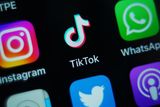Long read: As the billionaire space race beats a path to the stars, how close is space travel for the rest of us?
Watching Bezos and Branson battle it out for supremacy in a show of tech testosterone may have muddied the previously altruistic ideal of space exploration, but they have also brought the reality closer. It is no longer a question of if but when, and why?
Astronaut in outer space against the backdrop of the planet Earth. Image by Andrey Armyagov and NASA
To those of us raised in the 1980s, space blazed into our homes aboard the Starship Enterprise. Some lacklustre planetary landscapes aside, the vision of space exploration set forth was noble and altruistic: “To explore new worlds. To seek out new life and new civilisations. To boldly go where no man has gone before.” These were ideals to aspire to, so we believed that space travel might be possible in our lifetime, at least for the best and the brightest.
And so, for idealists, the past few months have been somewhat conflicting. On the one hand, we have reusable rockets and more sustainable fuels. On the other, we have Jeff Bezos and Richard Branson, sort-of-astronauts, and the spectre of near-space becoming another playground of the rich. These missions had none of the reassuringly sober procedural of the uniformed NASA rank-and-file, an array of support staff fronted by intimidatingly capable astronauts.
Join the Irish Independent WhatsApp channel
Stay up to date with all the latest news














